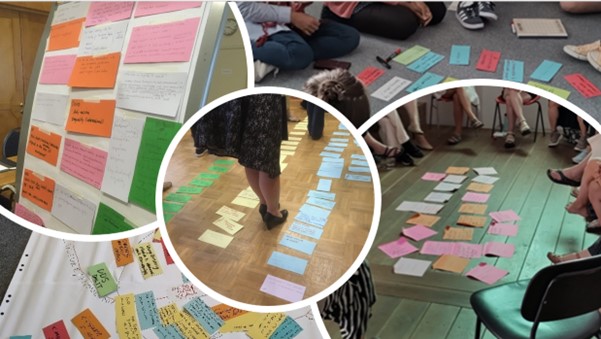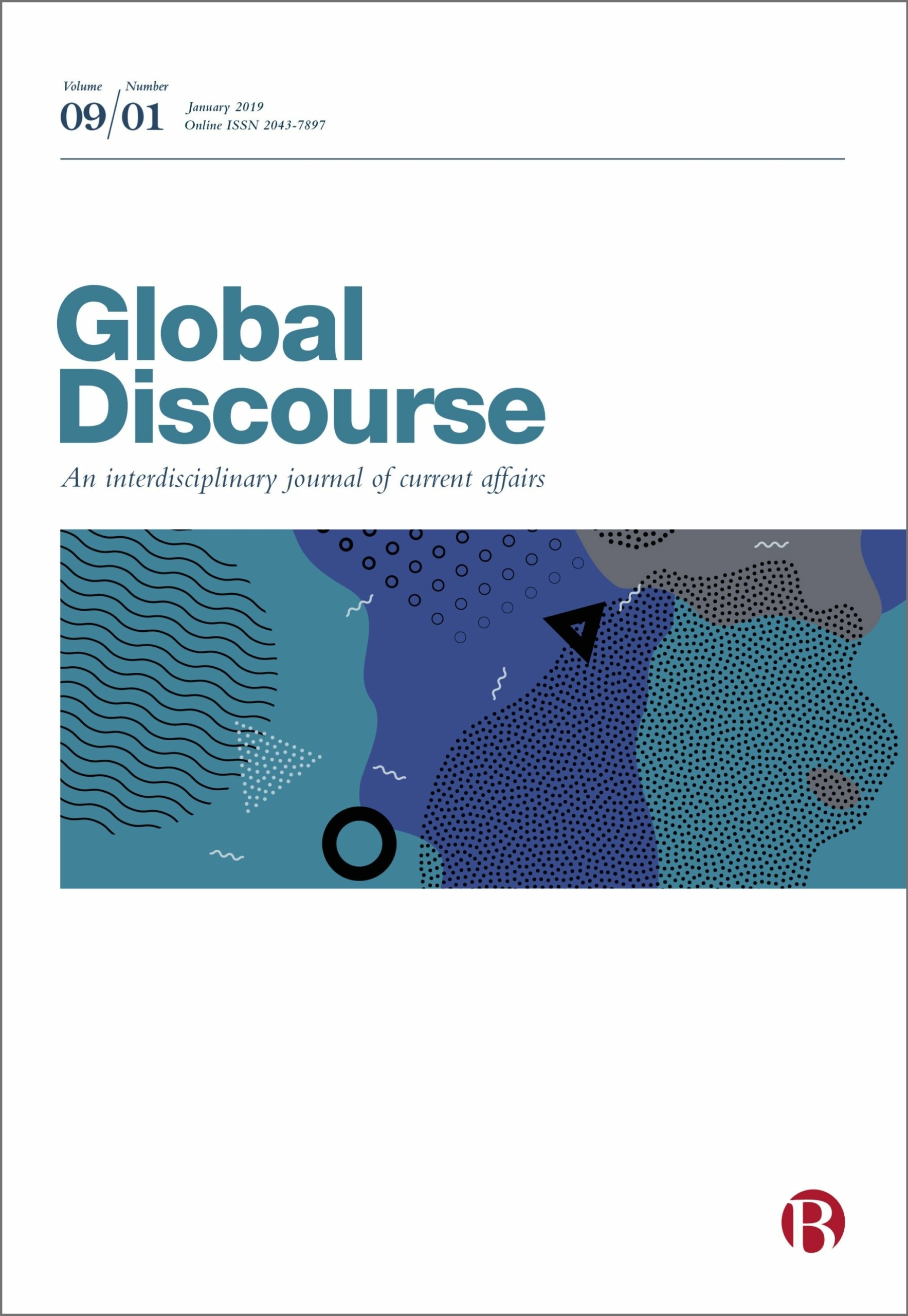In our recent article for Global Discourse, (Un)Doing performative decolonisation in the global development ‘imaginaries’ of academia, we have named ourselves ‘Two Convivial Thinkers’. This framing is deliberately decentring, because we COULD be anyone. And in an ideal world, where everyone’s knowledges could be observed, heeded or included equally, it would not matter who we are.
Unfortunately, that’s not the world we’re in. Instead, we recognise that we occupy different, but nonetheless privileged positions within global knowledge systems. And it is through our engagements as academics and activists within discursive and practical spaces loosely termed ‘decolonising development’ that, perhaps ironically, we have come to appreciate just how unequal and hierarchical these spaces are. While Higher Education (HE) holds the promise of disruption and solidarity to imagine our world anew, we can only do this if we are honest about the structures within which we operate. In the context of HE, development ontologies underpin whose voices are heard and silenced, whose labours are celebrated and hidden and whose bodies are included and excluded. Coloniality is not a historical, but a contemporary entanglement.
Celebrating our achievements amid ‘hidden’ labours
How do we attribute the ‘labour’ that goes into research? The extractive nature of research and publishing in HE is well-documented, particularly in the context of ‘development’ studies.

Yet how can we take credit for ideas, as named authorship forces us to do, that may have come through practices of care, conversations had, or ideas exchanged over some shared food or a cup of coffee? Claiming exclusive, ranked authorship would not only have imposed a hierarchy between the two of us, but it also erases all the supportive and generative conversations that have enriched our thinking. The support of fellow travellers reaches far beyond the intellectual but encompasses multiple practices and expressions of solidarity, conviviality and care. What about the person who fills the kettle, puts out the fruit and replenishes the biscuit tray? Again, a collective authorship name is therefore an attempt, however incomplete or partial, to acknowledge the communal nature of knowledge creation by actively avoiding trying to ‘take credit’.
Walking the talk in a neoliberal system?
Nonetheless, we MUST publish. We do this to showcase our work, to be visible, to occupy a niche with our name and, let’s be honest, to collect merits for our CV to climb the career ladder or at least help secure a permanent job within Western academia.
As scholars in the broad field of ‘development’ studies, we find ourselves confronted with the neoliberal logics of the institutions of Western HE that employ and fund us. These include an incentivisation of individual merits coupled with extreme productivity expectations measured through quantitative metrics and indicators underpinned by the language of outputs and deliverables. It is perhaps ironic that these ‘technocratic’ tendencies have been extensively criticised by ‘development studies’ in relation to ‘development practice’.
What we imagine decolonial scholarship to be is non-hierarchical, horizontal, inclusive and collaborative. We imagine time to think together and to learn from each other; to be caring and kind rather than competitive; to centre knowledge and voices of the majority world that continue to be marginalised, rather than those of Eurocentric scholarship; to share knowledge and make them accessible to all, beyond the boundaries of language and institutional access. Nor does Open Access (OA) go far enough to address this problem. OA too is a privilege; it’s clear that buying this privilege has meant that our article is being read because we had the resources to make it freely available, while other articles with no less intellectual insight and value are not being read.
For some, even to dream of ‘decolonial’ futures, we have learned, is a luxury. Encounters with colleagues operating at the ‘peripheries’ who are considered in some way not quite ‘developed’, have told us that to even ask these questions is a privilege only afforded to people with our positionality. Those of our colleagues who may be read as either in or of the Global South, or from Europe’s (racialised) peripheries, have no such flexibility because NOT playing by the norms set by Western HE means not being taken seriously, both in the West and in their own ‘home’ institutions.
The language of ‘development’
Nowhere are hierarchies of ‘development’ more powerfully but also invisibly expressed than through ‘language’.
The issue of language is complicated and paradoxical. English, a colonial language, remains the default of academic publishing. As a result, only those who can publish in English have a chance of being read, and only those who can read English have a chance of accessing knowledge. What remains invisible and marginalised are not only lived experiences and oral traditions, but also any argument made in another language, and its speaker. If we recognise the situatedness of our knowledges, then nuance and emotion play an important part in how we express ourselves. Studies show that the mother tongue is the language of emotion, it is foundational for our thinking-feeling and how we can convey it. Isn’t it paradoxical that most of us write in English, despite its being a second or even third language for so many of us?
The two of us continue to co-write in English, simply because this is our one common language. And because we want to be read.
Who is allowed to be mobile?
In our work over the last five years, slices of which we have tried to capture in this article, the provenance of ideas and the labours of research have been further complicated by questions of mobility. Who is allowed to travel? Well-documented concerns of visa travails for African scholars in particular resurface year-on-year as bodies, and the potential knowledges they carry, are systematically erased due to carceral border regimes. This is not, however, any less of a concern for our colleagues who may be understood as either in, or of, the so-called Global South, and whose mobility WITHIN Europe is, as a result, severely constrained. As holders of Canadian/British and German/EU passports, we can basically go anywhere, very rarely if ever having to subject ourselves to lengthy visa processing times and associated costs. What do we lose when we are not even able to ensure equity of participation in our scholarly spaces? Statements of solidarity and panel discussions feel more than hollow if, in the end, some scholars are just more ‘equal’ than others.

(In)conclusion
So finally, how do we respond to the question posed in the heading? Right now, we think trying to ‘do’ decolonising in the context of Western HE in a way that does justice to the thoughts conveyed by decolonial engagement is at best challenging and incomplete. It requires us not only to ask questions every step of the way but also to fundamentally dismantle almost all of the logics that hold up neoliberal academia. This is a daunting task, but it doesn’t mean that we should stop trying.
In no particular order, Two Convival Thinkers are Julia Schöneberg (julia.schoeneberg@uni-kassel.de) and Lata Narayanaswamy (l.narayanaswamy@leeds.co.uk). For several years we have been collaborating in different academic (www.decolonise.eu) and activist (www.convivialthinking.org) endeavours. As part of our commitments to shared, decolonial scholarship, we are trying to actively challenge the hierarchies created through academic markers that are part of the politics of citation. In choosing to publish under the pen name of ‘Two Convivial Thinkers’ we are not making a point about anonymity. Rather, want to draw attention to how traditional citational practice represents both hierarchy and erasure. Setting out our authorship as a ‘convivial’ effort is the only way we feel we can do justice to the collective endeavour of all friends and colleagues sharing as generously as they have done.
 (Un)Doing performative decolonisation in the global development ‘imaginaries’ of academia by Two Convivial Thinker in Global Discourse and is available open access on Bristol University Press Digital here.
(Un)Doing performative decolonisation in the global development ‘imaginaries’ of academia by Two Convivial Thinker in Global Discourse and is available open access on Bristol University Press Digital here.
Bristol University Press/Policy Press newsletter subscribers receive a 25% discount – sign up here.
Follow Transforming Society so we can let you know when new articles publish.
The views and opinions expressed on this blog site are solely those of the original blog post authors and other contributors. These views and opinions do not necessarily represent those of the Policy Press and/or any/all contributors to this site.
Image: Dom Fou vis Unsplash


